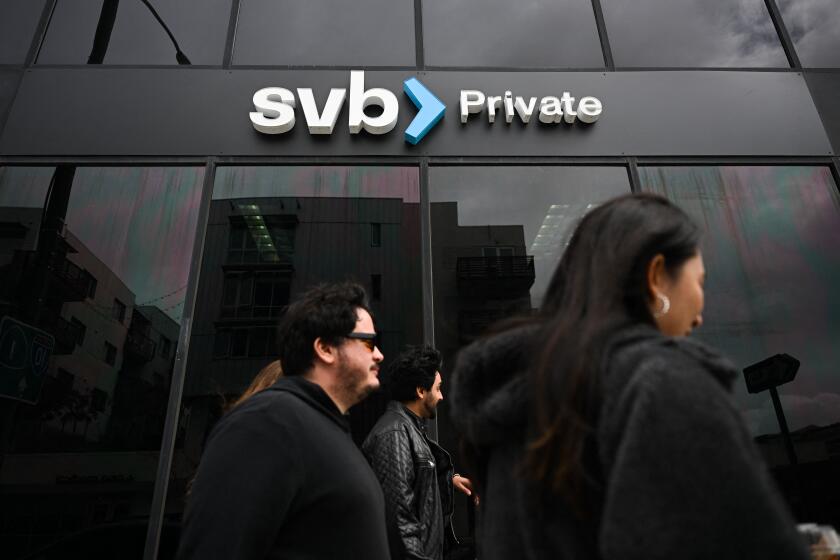Heads of failed banks refuse to accept blame, defend their pay and bonuses

Top executives at Silicon Valley Bank and Signature Bank largely avoided taking responsibility for their banks’ dramatic failures at a Senate hearing Tuesday, instead using their time to assign blame to events they said were largely out of their control.
The arguments got little traction with senators on both sides of the aisle. Democrats and Republicans on the Senate Banking Committee criticized the executives for taking risky actions or missing obvious problems that directly led to the demise of their banks, while still accepting lucrative pay packages and bonuses, even in the days and weeks leading up to the failures.
“You were paying out bonuses until literally hours before regulators seized your assets,” said Sen. Sherrod Brown (D-Ohio), the chair of the committee. “To most Americans, a lack of Wall Street accountability tracks with their entire experience with our economy. Workers face consequences; executives ride off into the sunset.”
More than a handful of senators asked if the executives would consider returning part of their compensation, since bank failures are shouldered by the Federal Deposit Insurance Corp. and other banks in the system. Each of the three executives testifying demurred.
Greg Becker, Silicon Valley Bank’s former chief executive, took the brunt of the criticism from committee members, although Scott Shay, the former chairman and co-founder of Signature Bank, also came under fire. Signature’s former president, Eric Howell, also appeared.
The California Department of Financial Protection and Innovation released its report on the events that led to the March 10 failure of Silicon Valley Bank — but the remedies aren’t fully clear.
Becker used his testimony and answers to senators’ questions to say that Silicon Valley Bank was a victim of a confluence of factors, including a social media-driven bank run. Regulators have said that customers pulled $42 billion of deposits from Silicon Valley Bank on March 9, one day after the bank announced it needed to raise capital.
“You say you took risk management seriously. I find it hard to believe that comment,” said Sen. Tim Scott of South Carolina, the ranking Republican on the committee.
A number of senators faulted the executives for failing to guard against the impact of rising interest rates. The Federal Reserve rapidly increased rates starting in March of last year, which reduced the value of large loans the bank issued as well as Treasury bonds the bank bought when rates were much lower.
An exasperated Sen. John Kennedy (R-La.) pointed out that Silicon Valley Bank even sold off financial contracts, known as hedges, that could have mitigated some of the impact of rising rates. He called the bank’s interest rate management “bone deep, to the marrow, stupid.”
Becker was criticized repeatedly for handing off the bank’s interest rate risk issues to a committee instead of being more directly involved, as well as the fact that Silicon Valley Bank was repeatedly found deficient in multiple parts of its businesses by bank regulators. He was also criticized for going to Hawaii immediately after his bank failed.
From Silicon Valley Bank’s failure to the rescue of First Republic, keep up with the latest developments in the crisis of confidence afflicting banks in California and beyond.
Senators also used the hearing to address executive pay and whether senior executives in the U.S. are being rewarded more for short-term gains — like rising stock prices — than for ensuring their companies’ long-term health.
Executives at Silicon Valley Bank and Signature Bank were paid millions of dollars over their tenures up until their banks failed, the bulk of the compensation coming in the form of company stock. That stock is now largely worthless, but the CEOs still pocketed millions from the sales of their shares before the banks’ collapse.
Becker received compensation valued at roughly $9.9 million in 2022, and also sold stock in the company only a few weeks before it failed. Joseph DePaolo, CEO of Signature Bank, also sold stock in the company in the years leading up to its collapse. DePaolo did not appear in front of the Senate committee on Tuesday due to health concerns.
Sen. Elizabeth Warren (D-Mass.) asked both Becker and Shay if they would forfeit any of their compensation to the FDIC, which covered their banks’ deposits after they failed.
The executives said they would not be giving their money to the FDIC.
The moves to tighten rules on midsize institutions come as the Biden administration searches for tools to further calm the banking crisis and prevent another failure.
Warren called their response “just plain wrong,” adding “if we don’t fix it, every CEO for these multibillion-dollar banks will keep right on loading up on risks and blowing up banks and everybody else is going to have to pay for it.”
The anger over CEO pay echoes that of roughly 15 years ago, when the 2008 financial crisis led to taxpayer-funded bailouts of major banks. The CEOs and high-level bankers still received millions in pay and bonuses, most notably at nearly failed insurance conglomerate American International Group.
Clawing back CEO pay has gained bipartisan attention despite the fierce divisions between the two political parties. Four senators — two Democrats and two Republicans — have introduced legislation that would give the FDIC authority to claw back any pay made to executives in the five years leading up to a bank’s failure. Warren is one of the bill’s sponsors.
Executives at big companies tend to get most of their pay each year in company stock. That means CEOs and other insiders have much to gain if the company’s stock price rises. Shareholders generally agree that by tying a CEO’s compensation to the stock price, it better aligns their interests with shareholders.
But executives also have a lot to gain if they can sell their stock before the share price takes a steep dive. In his testimony, Becker said his stock sale in February was was a planned sale.
Since 2000, the Securities and Exchange Commission has given CEOs and other corporate insiders a way to defend themselves against charges that they bought or sold stock using information unavailable to others, an illegal practice known as insider trading.
The method, known as the 10b5-1 rule, lets insiders enter into written plans to buy and sell stock in the future. The goal was to let insiders make trades, but not when they have their hands on material information not available to the public.
Over the years, complaints have risen about insiders abusing some loopholes in the 10b5-1 rule. In December, the SEC announced amendments to close the loopholes.
AP writers Stan Choe and Stephen Groves contributed to this report.
More to Read
Inside the business of entertainment
The Wide Shot brings you news, analysis and insights on everything from streaming wars to production — and what it all means for the future.
You may occasionally receive promotional content from the Los Angeles Times.













